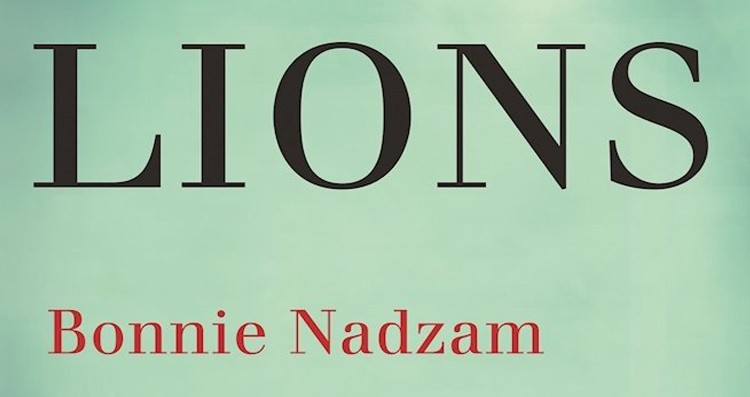Books & Culture
A Small Town and the Ghosts That Haunt Its People
The town in Bonnie Nadzam’s second novel is as much about its ghosts as the ghost town it has become

If abandoned sugar beet factories and rusty grain elevators are obvious signs of post industrial decay, then the fictional town of Lions, Colorado, is doomed. But in her second novel, Bonnie Nadzam is not interested in linear narratives that start in abundance and end in ruin. Rather, the story of Lions is as much about its ghosts as the ghost town it has become. Chapters sway back and forth like alfalfa in the hot Lions breeze, alternating between the town’s goings-on and its legends. We meet the Walker family — John, his wife Georgianna, their son Gordon — and just as quickly lose John, who dies suddenly. For the rest of the book, Georgie and Gordon die slow deaths of their own.
Moments before he dies, John gives his son a list of instructions. He requests his son to follow them, but does not compel him to. Gordon neither agrees nor refuses, but in the quiet of the hospital room something shatters in Gordon’s mind; it is the first time his father has asked him for help. Readers aren’t surprised, therefore, by Gordon’s silent compliance with his father’s demands, even if the other characters wonder what he’s up to each time he sets off in his late father’s blue Silverado, and returns days later, shaggier and skinnier. Perhaps it has to do with Lamar Boggs, or Lucy Greaves, or Honora Strong, whose ghosts are as local to the town as Boyd’s bar and May’s diner. Perhaps Gordon’s secret trips have to do with something else. Whatever the reason, only one character is desperate to figure it out.
Leigh Ransom, May’s daughter, grew up next door to Gordon and the Walkers. The two children inevitably fall in love and plan a life together far, far away from Lions. Leigh dreams of college, restaurants, fashion, a family (one boy, one girl) — all of it with Gordon. Yet she knows as well as her mother and the rest of the town that the Walkers are different, and that building a future with one may not be possible outside of this town, so rooted are they to the land. For all her whims of luxury, Leigh knows that Gordon, like his father, is a detached man. The word “need” perplexes him, just as John, whose reputation as a welder has spread far beyond Lions, rarely accepts money for his painstaking work. John consistently engineers elegant solutions out of scrap material, and Gordon skips out on regular kid activities to cut metal with deadly precision. Both provoke wonder and suspicion among their peers; John’s clients come from all over the state, and Gordon’s classmates tease him from outside the shed. But neither looks up from their activities or discusses any other way to fill their time. In a town of unbearable heat — “flat as hell’s basement and empty as the boundless sky above it” — father and son toil daily in the shop dressed in wool, to avoid electrocuting themselves. Because for a Walker, not dying is reason enough to work.
So when Gordon travels north out of Lions to continue his late father’s secret errand, in the opposite direction of Leigh’s college dreams, Leigh knows she is losing him. But how to stop loving him after years of their own private rituals and visions for the future? As Gordon spends more time away, Leigh feels him more intensely in her heart “an old song in a haunted place, a flare of heat in her chest, a key that fitted a door.” He is her own, her only wooly-skinned protection against sure death.
Yet Gordon’s responsibility, given to him by his father moments before he dies, transcends a mother’s worry, a girlfriend’s love, a college-enhanced future. As he eventually explains to Leigh, “Insofar as Lions was a place of air and light and rock, he was not so much driving out of town as he was driving deeper into it, beneath it, say, or within it. It felt like a dropping down, not a driving away.” That same air and light and rock are apparent when Gordon drives: checking “the road ahead, the rearview, then the side mirror, shifting his gaze in a triangle of points, he’d see a shadow racing around, just ahead of his vision, like an intuition that’s there, and gone.”
Like her descriptive sentences, Nadzam’s dialogue sings, it’s so smooth. She scripts a conversation between hardened old farmers slowly drinking Coors Light at the one bar in town just as easily as she captures the delirious babble of a grieving widow with her life-long neighbor. She expertly provides the tall, reticent stranger with as many hand gestures as words, and she extends beyond technical talk and into philosophy whenever John and Gordon speak about their work in the shop:
“You’re not operating from a belief system, Gordon,” he said. “You’re working with a successive approximation of facts. Work with what you know. And what you don’t know, don’t guess.”
“Ok.”
“Don’t tell yourself a story about it.”
“I wasn’t.”
“Make your own observations. Don’t take my word for it — or anybody else’s.”
But Nadzam’s strength isn’t merely possessing words that roll off the tongue. She also has a knack for building her sleepy, sleepless, rustic, neglected town out of a trifecta of color, pattern, and movement. Like the book’s cover, Lions is suffused with blue. Everything is blue: grass, a spruce tree, the moon, dishrags, jeans, fields of new wheat, the walls of the bar, Georgie’s checkered curtains in windows all over town, thin tea towels blowing on a clothesline, veiny hands, ashes, snow, Gordon’s flannel shirt, chimney smoke at dusk, Gordon’s mug in the shop, eyes. The sky is “aching blue,” and later “a perfect heartache blue.” And this is just one color, one layer of a complex concoction.
Similarly, everything in this overheated town is dancing: weeds stretch from front doors to the ditch, curses ripen, and little flowers spread “like pink smoke over the grass.” In her interview with the Center for Fiction after her first novel Lamb, she says, “If life were a sentence, you might say I’ve been looking for the fresh verb.” Indeed, it appears that she has found her verbs and her adjectives with this strange town named Lions:
From the slight inclination of the plain, it must have appeared a shipwreck awash in grass — the old splintered homesteads half sunk in dirt, the small crush of lights in the distance from the diner and the bar where anyone still surviving had gathered together to ride out the coming night.

Nadzam has written the story of a town ill-befitting of its majestic name set under an angry sun and surrounded by malnourished grass and alfalfa. There is one diner, one gas station — the second went out of business — and one bar, and the few residents who gather at these establishments have lived as much in their homes as they have in their neighbors’. But in spite of the dreary hay-colored landscape, John, Gordon, Leigh — even the tall stranger — are rainbows of emotion, ambition, imagination. What else do they have if not their stories, even if those stories are borne of spirits and ghosts waiting in the tall grass, ready to pounce?









